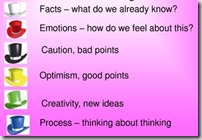 I decided to take a break from the snow and the startups today and attend two seminars this week: an Innovation Masterclass at St. Johns Innovation Centre, and a CETC forum debating the Cambridge 2030 initiative.
I decided to take a break from the snow and the startups today and attend two seminars this week: an Innovation Masterclass at St. Johns Innovation Centre, and a CETC forum debating the Cambridge 2030 initiative.
=============
The Innovation workshop promised to offer creative problem solving techniques, help generate new ideas that will unlock new market opportunities, grow sales and improve bottom line performance. We can all use a little more of that.
The event was sponsored by the new UK Department of Business Innovation and Skills, combining key government support services: UKTI (international trade), MAS (manufacturing advisory services), and GA (the growth accelerator). GA turns out to be a coaching service, which means it’s self-consciously loud, superficially enthusiastic, and looking for paying clients.
 The seminar used a decision methodology, the Six Hats, that force examination of problems from different angles. They roughly parallel the Myers Briggs dimensions of personality and simulate bringing diverse opinions together.
The seminar used a decision methodology, the Six Hats, that force examination of problems from different angles. They roughly parallel the Myers Briggs dimensions of personality and simulate bringing diverse opinions together.
We brainstormed Burger King: Who comes to the restaurant (teens, families, businessmen looking for WiFi), What do they want (predictable, clean, safe, convenient, cheap), How could it go wrong (kids get sick, manager hassles you, gang uses it as a clubhouse), How would you present it (clean the rest rooms, patrol the parking lot, train the staff).
The level of business-speak would make Lucy Kellaway sigh. Do people talk about leveraging asset-based customer-centric skillsets because of training, peer pressure, aspirations, or simplicity? Innovation is not exploiting invention to deliver transformative value, it’s simply creatively doing things better. I innovate because it’s a kick, it’s fun, it gets appreciation, not because it builds sustainable barriers to competition while maximizing customer value.
In all, a wasted two hours of being hot-boxed like I was being sold a Turkish rug. ‘better to spend your time browsing MindTools.
==================
The CETC seminar, in two-hour contrast, was thoughtful, informative, and even somewhat inspiring. The problem is “What should Cambridge Become?”, and a local group has been hosting public forum around ten key topics like transport, waste, housing, education, and culture. Their two-year outputs had to be a single sheet of recommendations on A4 paper, and a single slide: jargon was completely absent.
It highlighted two things for me.
First, the limits of land use maps. Cities are living things and the problems have to do with flows. How do you move people, goods, water, information through a city; where do you connect (not direct) new businesses and homes?
Second, the sprawling impact of decisions. AstraZeneca is building a research facility and creating 10,000 new jobs. Wonderful! But that brings 30,000 new people, and their cars, wanting housing, sending children to schools. Who provides for all of that; who pays for all of that? And what does it do to the quality of life for everyone else?
A member of the County Council responded. Most political discussion is us/them, takers/makers, news-bites that pass for reasoned debate. In contrast, this bureaucrat had really spent a lot of time thinking about these questions, talking with government officials from nearby villages, and implementing solutions.
What do we do with green belts? He wanted to convert a bit of fallow farmland into parks and homes. I disagree, but I respect the discussion that balanced the viewpoints. What about a congestion charge to limit traffic in the center and pay for expanded transport? It wouldn’t work if all the money raised went to Whitehall. What about ideas to link schools and businesses more tightly? he knew what was being tried and what might work.
When he talks about the frustrations of raising local revenue and ideas, then losing it to national taxes and regulations, he voiced the same frustrations as any business owner. I’d hope that government has lots of folks like this, and that we realize they have a constructive role in building and maintaining communities.
I navigate the Border Agency procedures, ride the Guided Bus, pay my Council Taxes, set up shop in the Incubator. I’m glad to meet people taking the long view of how to make it all work together and better.
The GA could take a few lessons.

